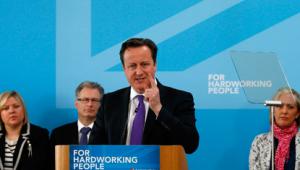It’s not just ‘the size of the cheque we give people’ that matters, Prime Minister David Cameron told us this week in Birmingham.
Yes, but it helps. As the coalition is rapidly finding out, a large chunk of Middle England thinks that losing thousands of pounds each year in Child Benefit payments matters rather a lot – particularly when it penalises none-too-wealthy single parents and stay-at-home mums.
In reality, the Tories took not so much an axe as a scalpel to welfare spending at their conference.
Abolishing Child Benefit for higher-rate tax payers will save the Treasury just £1bn, barely a dent in a welfare budget that accounts for nearly one-third of public expenditure.
But the move was hugely symbolic. By breaching the principle of universality that underpins the welfare system, it paves the way for far bigger savings in the benefits bill – a sensitive subject in Treasury negotiations with the pensions secretary over plans for a Universal Credit benefit.
Winter fuel payments, free pensioner bus passes and TV licences – all are within ministers’ sights. And the chancellor has already announced a cap of £500 a week on out-of-work benefits as a quid pro quo for the hit on the middle classes.
In his speech to the party faithful, the PM sought to steady nerves after the fallout over child benefit, claiming that the painful decisions ahead will be tough but fair.
However, as Peter Riddell points out (see 'Reviewing the situation'), this is only for starters. Even ahead of the Spending Review, public sector pensions and student fees are in the line of fire. And the full impact of 25% departmental cutbacks will take years to trickle down.
All of these steps, Cameron emphasised, are being taken ‘together in the national interest’. But it is town halls, not Whitehall, that will be in charge of administering many of them on the ground.
In a new and not entirely welcome twist on localism, local authorities are being given the job of implementing the benefits cap – a move that many council leaders believe could ghettoise claimants and put even greater pressure on services as homelessness rises.
Local government minister Bob Neill (see 'DCLG minister stands by 'radical' benefit reforms') has offered assurances, and some extra resources are promised to help with this new, quasi-benefit agency function.
But no-one’s throwing money at the problem. And it’s certainly not what most councils understood by their new ‘place-shaping’ role.
Judy Hirst is the Deputy Editor of Public Finance











